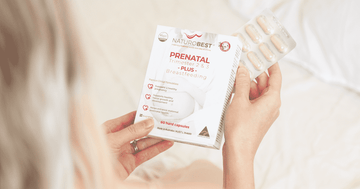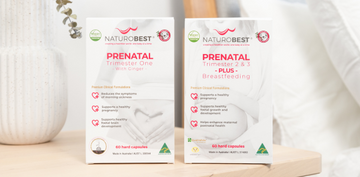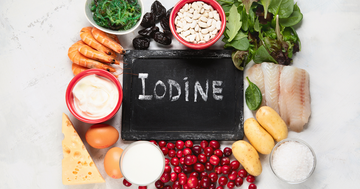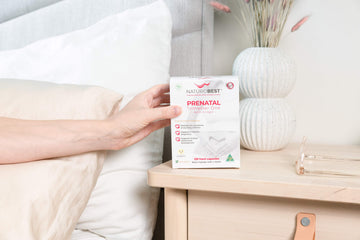Should I take prenatal vitamins after I find out I’m pregnant?
by Nikki Warren on May 02, 2022

You’re pregnant, congratulations! You are probably wondering what you need to consume at this time to optimise health. To support both you and your baby during this incredibly exciting yet physically and emotionally demanding time.
There is a wealth of information about the importance of pregnancy or prenatal vitamins. Which ones you take before pregnancy and which ones you take during pregnancy.
There is also a bit of confusion and misuse around the words ‘preconception’, ‘prenatal’ and pregnancy. Let’s clarify these different terms and stages to help you navigate your way through this amazing journey.
Preconception care is the health care a woman gets before she becomes pregnant. This also includes the healthcare a male receives if a male partner is involved. Preconception vitamins (or pre-pregnancy vitamins) are specifically formulated to support you and your partner during the preconception period. To prepare your body for a healthy conception and pregnancy.
Prenatal care is the health care a woman gets during pregnancy. Prenatal means “before birth” (during or relating to pregnancy). A prenatal or pregnancy vitamin is a specific formulation designed to support the growing needs of baby and mother during pregnancy.
Therefore, when we are talking about pregnancy multivitamins and prenatal multivitamins, we are talking about the same thing.
Should I keep taking prenatal vitamins after I find out I’m pregnant?
The answer is yes, absolutely!
Prenatal or pregnancy vitamins, are incredibly important and should be taken as soon as you find out you are pregnant. Ideally after taking preconception vitamins for 3-4 months prior to conception.
Prenatal vitamins are specially formulated to support a healthy pregnancy by providing specific nutrients in high demand during pregnancy.
They are designed to help support a healthy baby and optimal health for mum during this physically challenging time. If you are vegan, vegetarian or cannot eat certain foods, you may need to supplement.
More so for certain nutrients you lack in your diet, such as iron, choline or calcium. There is also a requirement for higher levels of folate in your diet when pregnant. This is especially important before week 6 when the neural tube closes.
My GP told me to take folic acid or folate – what is the difference?
The naturally occurring form of the water-soluble vitamin B9 found in food, is called folate. Folate is an essential B vitamin, found in food such as leafy green vegetables, citrus fruit, legumes and brown rice.
There are 3 forms used in supplements:
Folic acid is the name for the synthetic form which is used in dietary supplements, fortified foods and beverages. It has to go through several biochemical steps to be converted into active folate. This can be an issue for people with an MTHFR polymorphism.
Folinic acid, is one step removed from active folate and is found in food as well as dietary supplements.
Active folate, or 5-MTHF (5-methytetrahydrofolate) is the most bio-available form. It is more readily absorbed and used in the body and suitable for people with MTHFR polymorphisms.
Folate reduces the risk of birth defects, specifically in spine and brain development - spina bifida and anencephaly - by 50% or more. It may also lower the risk of miscarriage, especially in women with high homocysteine levels. An amino acid that contributes to blood clotting.
The World Health Organisation recommends that women begin taking 400mcg of folic acid (or folate). At least two months prior to conception. The importance of adequate folate levels during the preconception period is well established.
We recommend taking a quality preconception vitamin at least 3 months prior to conception. As well as following a preconception plan for both partners. To ensure the best possible chance of an optimal pregnancy and healthy baby.
Why should I take prenatal vitamins while pregnant?
Prenatal vitamins or pregnancy multi-vitamins contain several key nutrients that research has shown to be vital during pregnancy.
In addition to folate, it is recommended to take iodine. A diet deficient in iodine may result in slowed mental and motor development in infants.
Calcium and magnesium are also important minerals to consider supplementing during pregnancy. Adequate intake of choline and vitamin D should also be considered.
If this is all feeling a bit overwhelming, don't panic too much. If you are wondering how you can get all these important nutrients into your diet there are ways to do this. A quality prenatal (pregnancy) vitamin will deliver all these essential nutrients and more.
For more information on how to choose the best prenatal vitamin. Check out Choose the Right Prenatal Vitamin for a great overview of what nutrients you need and why.
Do I need iron during pregnancy?
Iron can aggravate the symptoms of morning sickness and nausea. So we deliberately exclude iron from our Prenatal Trimester One with Ginger because of this. We also took the opportunity to add ginger and vitamin B6 for their well-known nausea-reducing properties.
An increased level of iron is more important in the last half of pregnancy, due to haemodilution. This occurs around week 16 of gestation and is a doubling of the blood volume. The body requires this additional iron to produce more blood to supply oxygen to your baby.
If you are suffering with morning sickness we recommend you only take iron in your prenatal vitamins during the second and third trimesters. To avoid worsening the symptoms of nausea and vomiting in your first trimester.
Disclaimer: This information is not to be used in place of medical care during pregnancy. If you have any health concerns, pre-existing conditions or specific dietary limitations, talk to your health professional.




